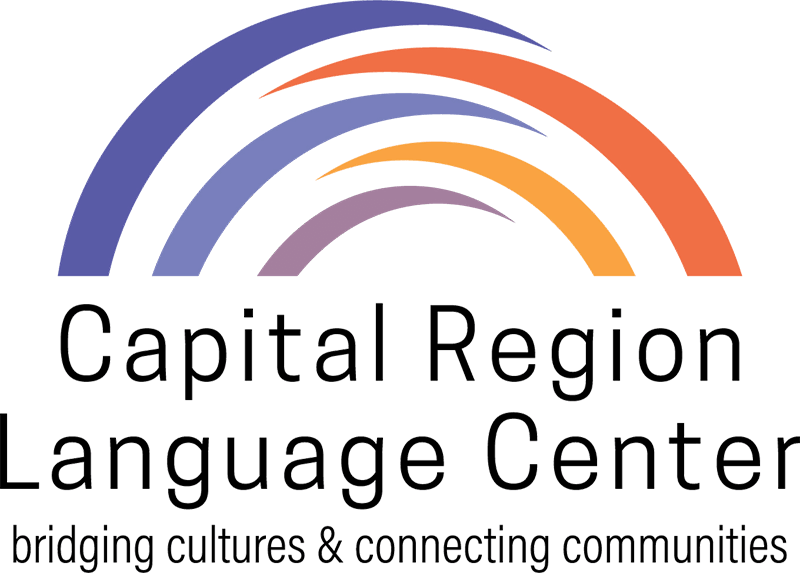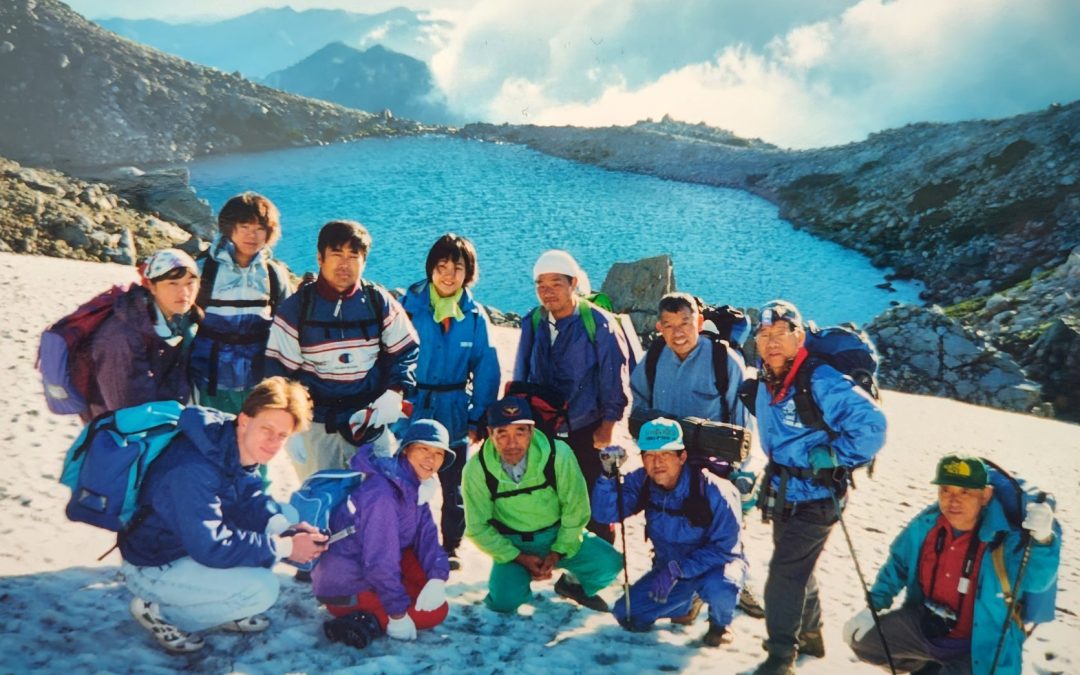Why a Focus Group Moderator is studying Japanese (again!) and learning French
Neal Sandin remembers the exact moment he wanted to learn another language.
“I was about ten years old, on vacation in Florida with family,” he recalls. “We were at a restaurant and this kid we befriended on the trip suddenly turns around and starts talking in Swedish to the people in the booth behind us. He had overheard their conversation and jumped in. I couldn’t believe it.”
Sandin was impressed. The friend never let on he knew another language.
“He did it without pause,” Sandin recalls. “It was such a superpower. I later found out he could speak like seven languages.”
‘Language Classes are my Mid-Life Crisis’
That memory continues to push him, almost 40 years later, as a student at Capital Region Language Center. He has returned to studying Japanese, a language he began in college. He also started French classes, which his wife can speak as well.
“I joke that at age 48, taking language classes is my mid-life crisis,” the Malta resident explains. “I chose this instead of buying a sports car. It will last me longer, be more useful and it’s less expensive, too!”
Sandin is quick to point out he is not a natural. In high school, he struggled through three years of Spanish.
“It was a nightmare,” he admits. “I just couldn’t wrap my head around it. So, when I got to college and there was a language requirement, I chose Japanese. I wanted a clean break.”
He was also intrigued by the characters.
“I wanted to understand how they are put together,” he says. “It is still my main drive. Once you start treating it as its own thing, with its own logic, it makes a lot of sense.”
Studying in Japan
He studied Japanese for his first two years at Guilford College in Greensboro, North Carolina. He went to Japan as part of a study abroad program, studying at Kansai Gaidai University, located between Osaka and Kyoto. A few days after he arrived, Sandin took a proficiency exam.
“It was humbling to score in the lowest level of speaking/listening and only slightly higher in writing/reading,” he recalls.
Read How a Recruiter for a Local Video Game Developer Passes China’s National Proficiency Exam
However, seeing his peers speak the language with such ease motivated him. It made it seem possible.
“I still had to study three hours a day to make my way through, and after about three months I could have a legitimate conversation,” he recalls. “I decided to stay another semester and spent my whole junior year there.”
When he returned to Guilford, he started spending more time with Japanese exchange students.
He loved his double major in international studies and religious studies, but admitted it was “slightly more useless than a philosophy major” when it came to job prospects.
Discovering JET: Japanese Exchange and Teaching Program
One day during his final year, he spotted a flyer promoting the JET USA Program (Japanese Exchange and Teaching Program).
“They would send me to Japan and I would continue to learn Japanese while I got paid to teach English,” he recalls. “I applied, was chosen and had a job right out of college teaching at a two high schools in Fukui Prefecture on the Sea of Japan.”
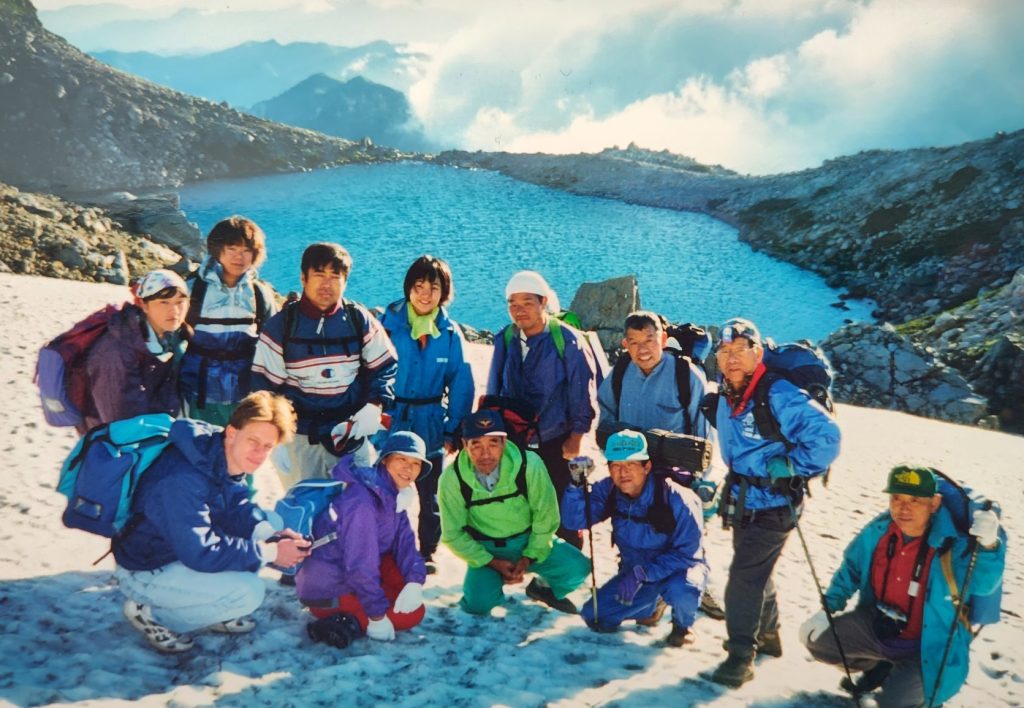
Sandin (front row, far left), shortly after arriving for his JET assignment. Climbing Mt. Haku-San with the vice-principal and some students from one of the high schools where he taught.
Despite the motion sickness from traveling switchbacks on a bus up a mountain to reach one of the schools, he loved teaching.
“I made great friends that I’m still in touch with and climbed Mt. Fuji in a rainstorm,” he says. “JET exposed me to people I never would have met, from New Zealand, Scotland, Northern Ireland, and of course Japan. You get all those different world perspectives thrown at you.”
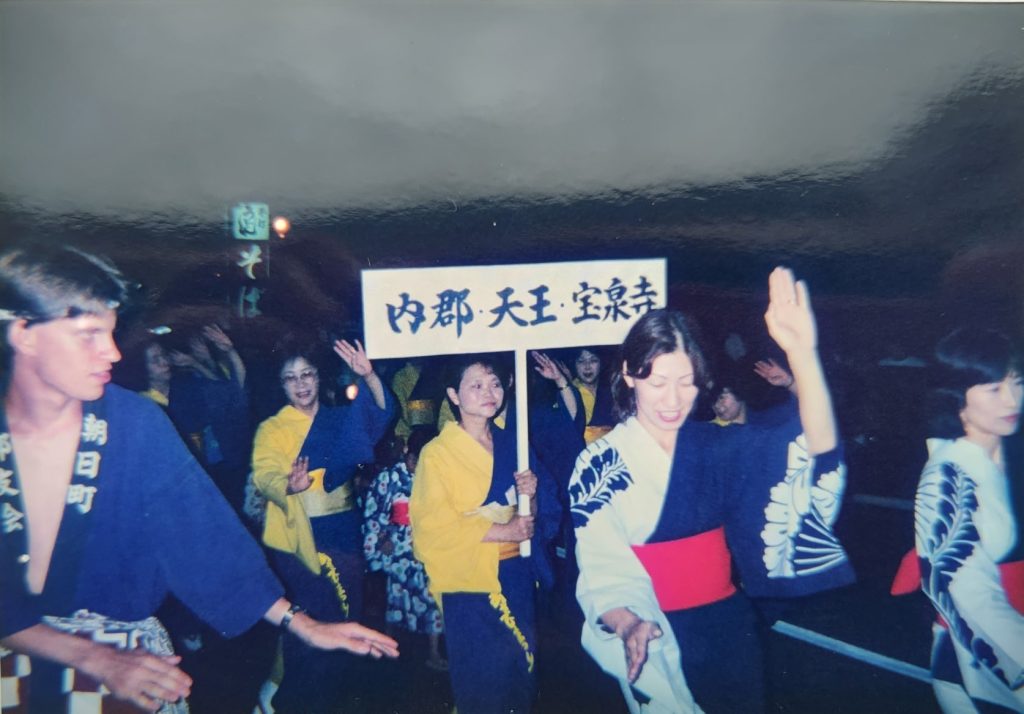
Sandin (far left), dancing at a festival while teaching English through the JET program.
Sandin returned to the US a year later, in 2000.
Getting Back to Japan
“I wanted to try my hand at writing, but wasn’t getting published, so I started thinking about how to get back to Japan,” he says. “I found a program to get certified in TESOL (Teaching English to Speakers of Other Languages).”
He got certified in Barcelona and then later hired by Westgate Corporation, which places teachers at Japanese universities to teach English. This time he was just outside of Tokyo for about 3 months.
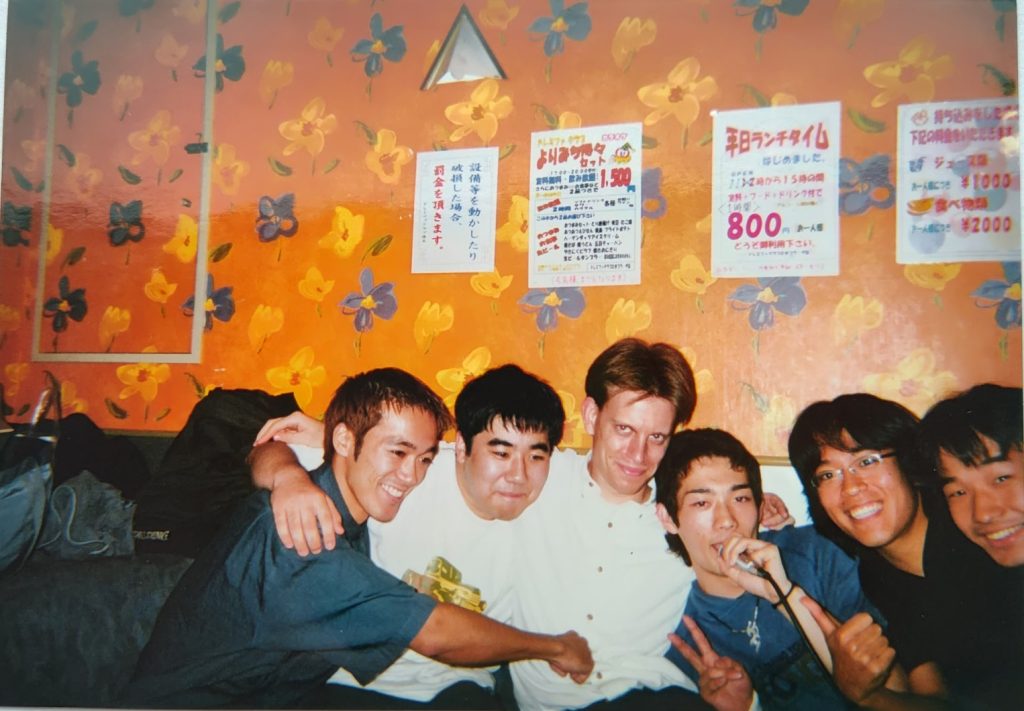
Sandin (3rd from left), was invited to karaoke by his students while teaching through the Westgate Corporation, outside Tokyo.
He returned to New York City, interning at the United Nations while completing a Master’s in International Affairs at The New School. He wanted to work for the UN or an affiliated not for profit, but found work at NHK, Japan Broadcasting Corporation, Japan’s public broadcasting station. As a news producer, he focused on business and economics. However, after Hurricane Katrina, he covered the devastation in New Orleans.
Eventually, he switched careers and has been in market research for over a decade.
“I sort of fell into it, but as a focus group moderator, I find it draws on the skills I developed as an English teacher and journalist.”
Alice in Borderland Brings Him Back to Japanese
Sandin met his wife in New Jersey, but the couple relocated to Malta just before Covid. One night, while watching Alice in Borderland, the Japanese science fiction thriller drama series based on the manga character, he found he wasn’t picking up dialogue easily.
“It bothered me,” he said.
His next step was reading The Power of Language by Viorica Marian.
“She explains what language learning does for the brain, how it makes it more plastic, helps foster more creativity and postpones neurological degradation,” he explains.
Listening to the audio book on Amtrak, heading back from New York City, Sandin had another a-ha moment.
“If I want to be a creative person, I should learn a language,” he told himself. “Why don’t I finish up learning Japanese? That’s when I connected with Capital Region Language Center.”
He started classes 18 months ago, thinking it would be easy to jump back in.
“I have since realized you never really ‘finish’ learning a language,” he says, laughing. “There’s slang, new phrases, ways to compose an argument. We are constantly doing the same thing in English, too, we just don’t realize it.”
Adding French and Setting Goals
Soon after, Sandin added French. Each week, he studies Japanese with Yoko Segerstrom and French with Oudou Sanogo.
“My teachers have been receptive to my goals,” he explains. They include being able to read books and use the language while traveling.
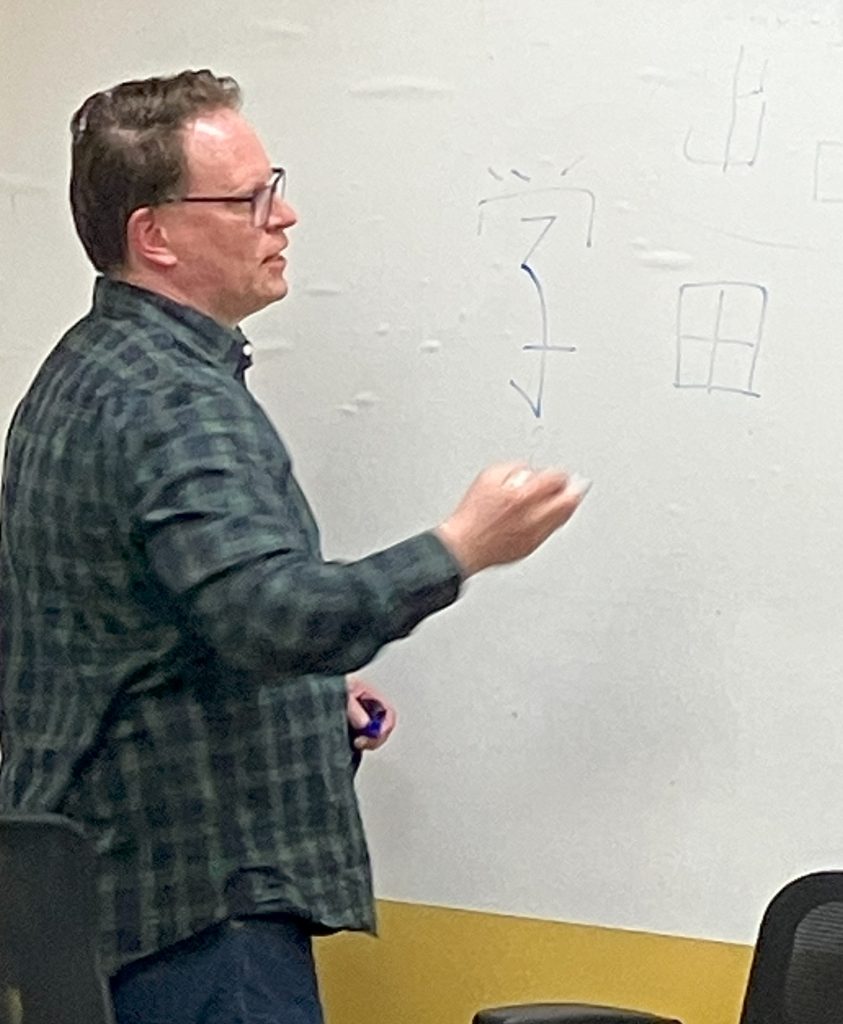
Sandin explaining Japanese characters at Capital Region Language Center, as part of an Open House with other JET alumni.
He and his wife plan a trip to France for their ten-year wedding anniversary. “My goal is to keep up with her and not need her as my translator,” he explains.
Once he passes the Level 2 Japanese Proficiency Exam, they will also visit Japan.
To get there, Sandin says the key to speaking another language is practice.
“I am fortunate in the way I work because I have chunks of time each week to devote to studying,” he says. That includes practicing words, trying to read books and using apps like italki.
“Right now, I am finding Japanese easier,” he says. “It still takes me a good ten minutes to loosen up and speak in French.”
No App Can Replace Added Value at CRLC
He says switching between French, Japanese and English is also challenging.
“My tendency is to speak French, using Japanese grammar,” he says. “French is subject, verb, object, while Japanese is subject, object, verb so it gets confusing.”
With those obstacles, Sandin says he is still enjoying the process more at this point in his life.
“It is like a puzzle to me,” he explains. “I really enjoy seeing how another world is organized through that language lens.”
He says he has tried all the language apps and can see how AI will enhance language instruction, but it can’t compare to the in-person experience he is getting at Capital Region Language Center.
“An app or software is never going to explain why certain words go together or make the cultural connection,” he explains. “English, French, Japanese – they are all spoken at a different tempo. You need to hear it, experience it. The whole point of language is to converse with another person.”
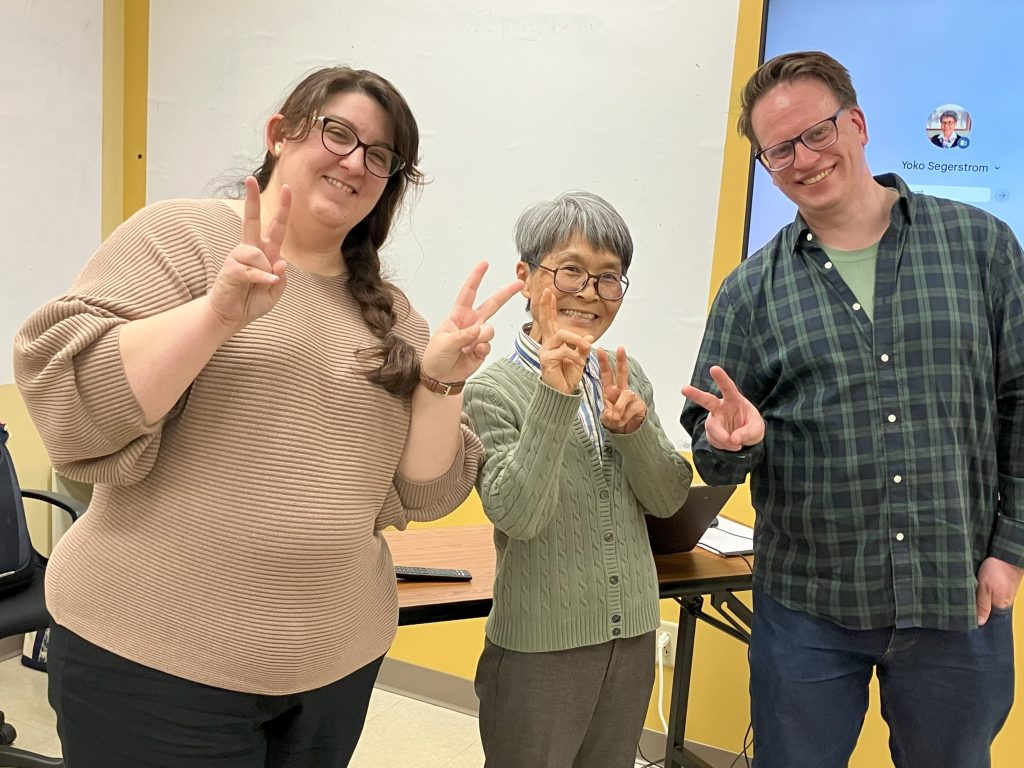
Sandin (far right), with his Japanese instructor, Yoko Segerstrom, and fellow JET alum, Cristina de Camargo at an Open House at Capital Region Language Center.
The added value comes from teachers sharing their own experiences with culture and etiquette.
Read About a Recent Japanese Etiquette Workshop for RPI
“You never point at people with your chopsticks, for instance,” he explains. “It’s rude. You never fill your own glass in Japan. That’s my job, as your companion, to notice you need more.”
Speaking Another Language Unlocks Creativity
Sandin says learning a language also means letting go.
“You have to be willing to be a child again and grow,” he explains. “As adults, we’re confident in how we navigate the world, but this shifts the ground under you. You flounder. My teachers are very patient. I have definitely said some stupid things!”
Sandin says he has no intention of ending his language journey.
“I have a list of four or five languages I want to study,” he says. While he appreciates it as a guard against dementia, what motivated him to start classes at Capital Region Language Center was the research that shows children who know another language have higher creativity and abstract thinking skills, years ahead of their peers.
“I want to be more creative in my writing, my ideas and how I view the world,” he explains. “I’m looking for new ways of seeing things, communicating and organizing my thoughts.”
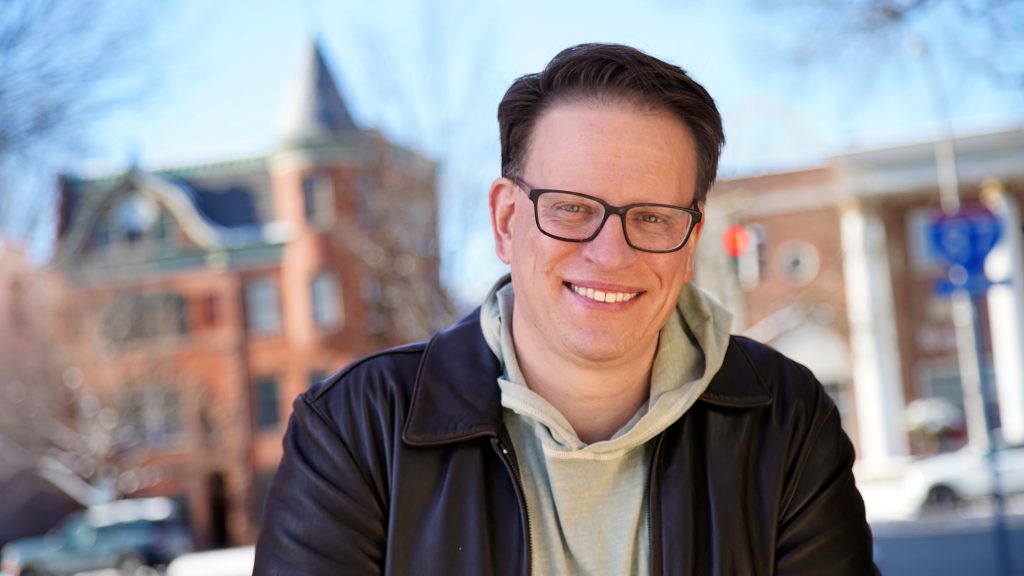
Today, Sandin studies both Japanese and French at Capital Region Language Center. He believes speaking another language is the most impressive thing a person can do.
He still thinks back to the kid in the restaurant.
“People can run a marathon or learn the guitar, but language is something you carry with you and pull out of your pocket at any time,” he explains. “You’re at dinner or in another country, it is such bragging rights to understand someone or eavesdrop in a conversation. What’s the most impressive skill that people have? For me, it’s speaking another language.”
To learn more about our classes or upcoming Open Houses, contact us at: info@crlcalbany.org or fill out our interest form.
